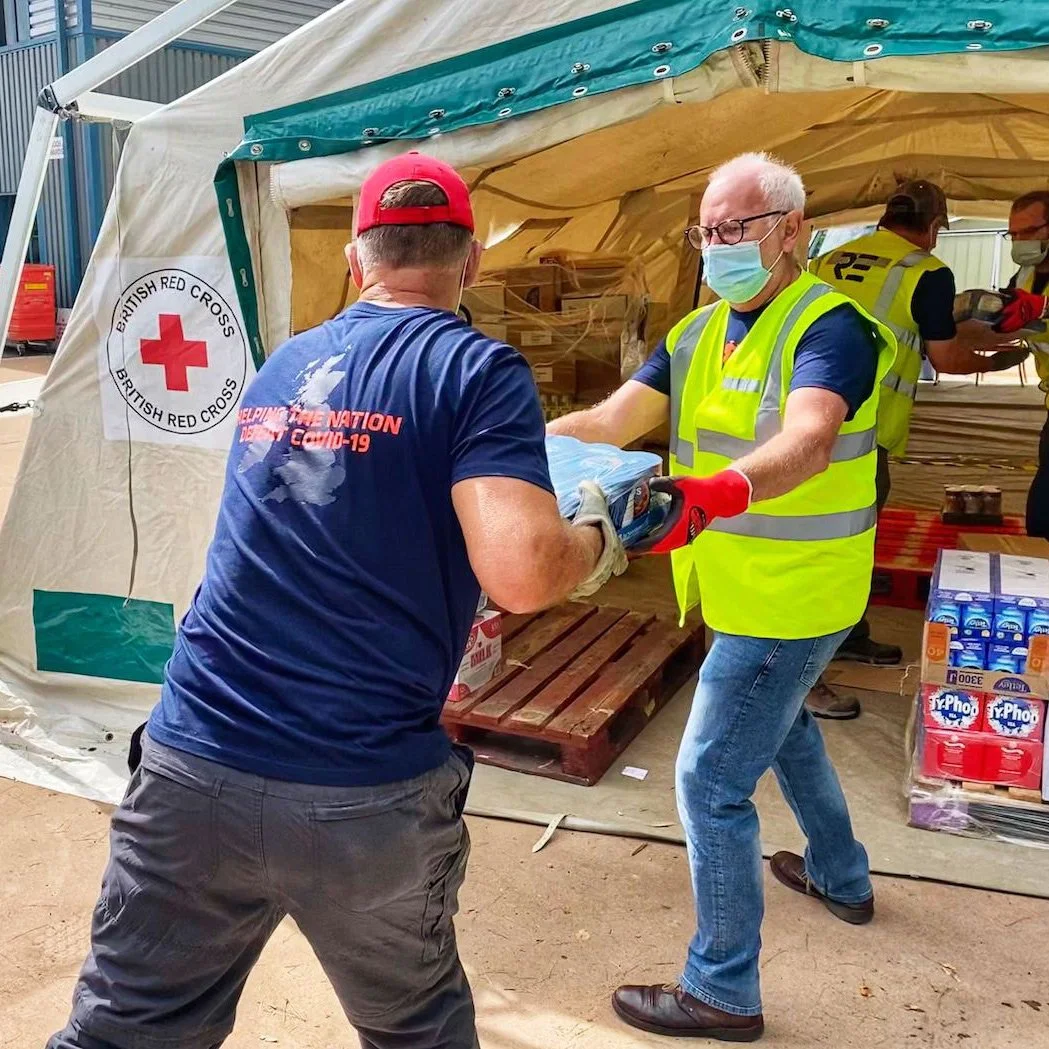Next Network Call
Our next network call will be held on Thursday 7 March, from 10:00 AM to 11:00 AM.
JOIN →
Next Capability Building Event
At our next capability-building event on 25 January at 9:45 AM, we will draw lessons and recommendations from across the sector where the impact of emergencies can disproportionately hit certain groups harder; alongside this, we'll explore how organisations are operating in this space further afield and what can be drawn from responses internationally.
JOIN →
Slack Channel
Slack is where we share information on activity relating to any emergency. Join in advance so that you’re set up and ready when the next emergency hits.
Cost of Living
This resource page draws together information in one place to support cross-region learnings. It has key guidance for partners, best practice, case studies, and pulls together data to present trends and summaries.
Explore
Resources
Case studies, summary notes from previous events, search our library of guidance docs and more.
Reports from the Sector
Insightful and thought-provoking reports that we and our partners have written for the voluntary and community sector.
Emergency Planning Tool
The Emergency Planning Tool is an interactive, web-based tool that will help partners visually explore risks their communities might face (such as flooding/heatwaves), the drivers for these risks by location, who and where people may be worse or disproportionately impacted (such as high proportion of elderly), and what resources are available to support (such as specific organisations or guidance) – so that they can target relevant and tailored preparedness activity where it is needed most.
Winter Preparedness
Seasonal challenges mean we need to be prepared to respond to a range of different crises and needs. This page provides insight from a variety of sources on topics which are likely to be of relevance to the VCS over the winter period. Follow the links below to access information, advice and government guidance.
Our events
The VCS Emergencies Partnership has a well-established programme of online events that run throughout the year. We are continually developing a programme, based on feedback, that supports partners to connect, share learning, and build our collective understanding of the capabilities required in preparedness, response and recovery.
While there are shared values across our delivery areas, each event has its own focus:
Capability Building Events - Share and learn with others the skills you need to prepare for emergencies. We focus on creating the space to learn from others in the Partnership through speakers and small discussion groups. Explore how we can tackle emerging and existing challenges together.
Network Calls - Listen to the latest updates and news from across the Partnership. We invite central government and policymakers along with experts from within our network to share and, most importantly, to hear your questions and feedback.
Partnership in Practice - Make friends before you need them. Our regional calls are the space to build connections across places and communities of interest. We focus on developing local solutions to shared problems, creating space for partners to share knowledge and insight on common aspects, lessons and themes. The approaches to these topics could be through regional tabletop exercises to build our understanding of emergencies and each other or through breakout spaces convening by partner type, geographical area (urban, rural, coastal), or communities of interest.
Our year at a glance
March
Thursday 28th – Network Call (10:00 AM-11:00 AM)
May
Thursday 2nd – Network Call (10:00 AM-11:00 AM)
Tuesday 21st – Knowledge and Insight Exchange (10:00 AM-11:30 AM)
June
Thursday 6th – Network Call (10:00 AM-11:00 AM)
July
Thursday 4th – Network Call (10:00 AM-11:00 AM)
Thursday 18th – Capability Event (09:45 AM-10:45 AM, 11:00 AM-12:00 PM)
September
Thursday 5th – Network Call (10:00 AM-11:00 AM)
October
Thursday 3rd – Network Call (10:00 AM-11:00 AM)
Tuesday 15th – Partnership in Practice (10:00 AM-11:30 AM)
November
Thursday 7th – Network Call (10:00 AM-11:00 AM)
Thursday 21st – Capability Event (09:45 AM-10:45 AM, 11:00 AM-12:00 PM)
January 2025
Thursday 9th – Network Call (10:00 AM-11:00 AM)
February 2025
Thursday 6th – Network Call (10:00 AM-11:00 AM)
Tuesday 11th – Partnership in Practice (10:00 AM-11:30 AM)
March 2025
Thursday 6th – Network Call (10:00 AM-11:00 AM)
Thursday 20th – Capability Event (09:45 AM-10:45 AM, 11:00 AM-12:00 PM)
Person centred approach to emergencies
The UK approach to emergency planning and risk management takes a proactive focus on collaborative approaches to reduce risk, build continuous improvement through exercising and raising community awareness and building engagement.
The Civil Contingencies Act 2004 outlines responsibilities for preparing and responding at all levels, with the UK Risk Register outlining the most significant risks to the country that trickle down to Community Risk Registers and Local Resilience Forum planning.
Despite this, we know from lessons and learning from emergencies, that specific vulnerabilities can be amplified and some communities are routinely disproportionately impacted.
The structure and efficiency of risk-based planning make it an effective approach when prioritising resources and efforts, utilising them where they’re most needed. However, it can exacerbate gaps and leave blind-spots in both the planning and response.
The complexity of individual needs when responding to a large scale incident can make implementing a person-centred approach harder to do, but there are significant strengths to adopting an approach that combines the strengths of each:
Application of approaches:
Supporting people during an emergency
As often the case, the answer to a complex question is the most simple one. The overwhelming response to ‘how we can deliver more person-centred care to meet people’s needs?’ was to just ask them how they would like to be supported, to treat them as a person rather than a process and listen to understand.
The importance of dialogue and being able to first listen then respond can typically be harder to do when faced with a time sensitive, high pressure situation of an emergency but we need to listen and understand the context for the individual. By entering into open dialogue you are meeting all parties at an equal level.
Opening a dialogue allows you to build knowledge of an individual, regardless of culture, origin or background. Knowledge is more than making assumptions based on whole groups of people but it is the ability to extract and draw knowledge to then use in the context of another persons needs.
Storm Babet October 2023
The impact of recent storms occurring in the UK has been felt by many, the frequency and severity of them over the past eighteen months has felt relentless with areas across the country experiencing power outages, strong winds felling trees, causing damage to properties and high levels of rainfall causing floods.
The rapid onset of flooding can catch even the most prepared off guard. In October of 2023 we were hit by Storm Babet which caused widespread flooding with over 1000 homes in England affected across Yorkshire, East Midlands and the Humber area.
9 people were killed as a result of the impacts of the storm, 83 year-old Maureen Gilbert was one of them. She tragically drowned unable to escape the rapidly rising water in her terrace home in Chesterfield, Derbyshire. Maureen lived alone, was disabled and housebound, following MET Office weather warnings her son, Paul Gilbert, had spent Friday 20 October attempting to secure her home with flood defences up to four feet high but neighbours said over 5ft of water had engulfed the inside of their properties “within minutes” of the River Rother bursting its banks on Saturday 21 October.
Maureen utilised the ground floor of her property, unable to make it upstairs due to mobility issues, when the flood water rapidly breached her home at ‘chest height’ she was unable to escape. 400 homes in the area were evacuated but neighbours said Maureen had barely left the house in years. Internal police and fire service investigations into the response and evacuation of homes in the area are being carried out.
The tragic outcome here indicates the very real consequence for disabled people in emergencies and the more broadly the need for emergency planning and community preparedness to support those most at risk of becoming vulnerable in society.
Application of approaches:
Guidelines in emergency planning to prepare and deliver a more inclusive person centred approach:
-
Include a diverse range of stakeholders in the assessment process, such as representatives from different age groups, genders, ethnicities, and abilities. Ensure that beyond a voice, marginalised groups have a role and are actively sought and included.
-
Embed training to create teams that are culturally competent and sensitive to the cultural nuances of the affected population. Respect customs, languages, and traditions to build trust and facilitate effective communication.
-
Recognise and address intersectionality by considering how multiple social identities (e.g., gender, ethnicity, disability) intersect to create unique vulnerabilities. This ensures that the assessment processes capture the diverse needs of individuals and communities.
-
Use participatory methods that involve affected individuals in the assessment process. This can include focus group discussions, community meetings, and surveys designed with input from the community to ensure relevance and accuracy.
-
Consider the specific needs of different genders and ensure that the assessment includes questions and methodologies that capture gender-specific vulnerabilities, such as gender-based violence, maternal health, and access to hygiene facilities.
-
Make the assessment tools and methodologies accessible to individuals with disabilities. This includes providing materials in different formats (e.g., Braille, audio), using sign language interpreters, and ensuring that assessment locations such as rest centres are physically accessible.
-
Implement child-friendly assessment methods that consider the unique needs and vulnerabilities of children. This may involve using age-appropriate communication methods and ensuring the presence of child protection experts during assessments.
-
Collect disaggregated data to identify variations in needs among different demographic groups. This allows for more targeted and effective response strategies.
-
If the emergency involves conflict, conduct assessments that are sensitive to the dynamics of the conflict, including power imbalances, displacement patterns, and security concerns. Ensure that the assessment does not inadvertently exacerbate tensions.
-
Prioritise ethical considerations, such as informed consent, confidentiality, and data protection. Clearly communicate the purpose of the assessment to participants and ensure their voluntary and informed participation.
-
Establish mechanisms for feedback and accountability. Communicate the assessment findings back to the affected communities and involve them in decision-making processes related to the emergency response.
-
Recognise that needs may change over time and be adaptable in the assessment process. Implement a continuous learning approach, incorporating feedback and adjusting strategies based on evolving needs.
Capability Event Documents 18 July 2024











